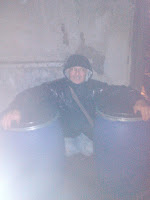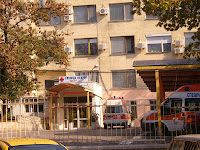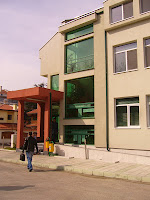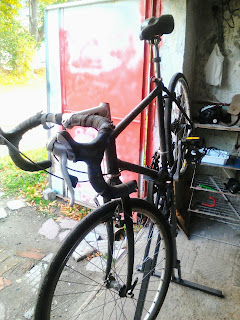Every year during the end of October to December the air around Bulgaria is filled with the distinctive smell of rakia. I don't need reminding as I've been waiting patiently for this time of year as I'm part of the enormous Bulgarian gangs of rakia makers responsible for this.
In case you didn't know rakia is a spirit normally of around 43-45% distilled from fermented grapes this time of year. Earlier in the year, rakia is made from other fruits that ripened in late Spring to early Autumn such as cherries, plums, apples, pears, etc.
 |
| Rakia made in previous years |
The grape version is by far the most popular with the majority of rakia made from this product as it doesn't need too much added sugar to top up the alcohol content on the initial fermentation. It also provided an avenue for grapes that are not fit for wine, no grapes are wasted in Bulgaria.
This year I had to buy my grapes, I had a good source in a local village which supplied me with around 80 kg of mature grapes at a good price. These were put in two big 120 litre barrels, crushed then mixed with 15 kg of sugar diluted with water. this was to get more alcohol content in the final must before distilling.
The barrels were stored in my garage and visited every day for the next 6 weeks to be stirred until fermented out. It actually took 7- 8 weeks for the gravity level on my hydrometer to read no more sugar was left in the must. This now was ready for taking to the village rakia house. There are around 6000 of these in Bulgaria, but being Bulgaria only around 1500-2000 are registered which is a legal requirement now. I booked one up in the village of Kukorevo some 5 kilometers from Yambol. I've been to various other rakia houses but this one was by far the cleanest, most well organised and of course legally registered. They provide transport for the barrels which were an issue for me with such a small car. The service they offer also included making the rakia so you didn't have to be there while the process was being done. This was something I didn't want as one of the reasons I make rakia was being part of the process and a product that is made from my own hands. Without this it was being close to just buying a product, so I just chose the transportation option.
 |
| Moving the barrels in pouring rain |
Along with the two barrels of grape must, fuel was needed, namely wood for the stove that heats the boiler (kazan). This was kindly given to me as a present from one of Galia's family. It was made up of lots of laminated MDF board offcuts from a renovated apartment. Nothing is wasted in Bulgaria and gratefully received. Added to the must was some old rakia that was leftover from a batch made in 2009. This was the last of the distilled must which read less than 40 percent proof and not good enough for drinking so it is saved for the next round of distilling albeit 8 years later. This was alongside old wine and leftover rakia and liquor from parties form a bygone age. Basically, anything that contained alcohol was mixed with the must, nothing wasted, all recycled. this is another reason I fell in love with the culture here. In addition to this was 1 kilogram of salt, 150 grams of bicarbonate of soda and the optional 100 grams of coriander seeds. These are to be added to the must just prior to heating up in the kazan.
The reservation was made for 7:00 on 28th November and the excited anticipation of that day was very much still there as it was on my first time back in 2006. It was agreed that the barrels and wood would be picked up the day before and be ready for the early morning process.
The kazan house van duly turned up at the garage at 7:30 pm in the pouring rain as we hauled the barrel up into the van leaving me with a wrenched wrist form the efforts(another story). The wood alongside and now in the hands of a Rakia Maestro and on their merry way to the village of Kukoreva to be greeted again early next morning. And in the midst of an injured wrist in the cold night and now soaked through from the rain, the excitement of the occasion to come builds further and overcame any pain and discomfort.
I rose the next morning before the alarm set for 05:00, the day had arrived and I was more than ready for it, despite not being able to use my left hand. Breakfast and bathroom served and I was off. Driving no problem, all the controls are on the right as had mustered the thoughts of managing the day single-handedly so to speak.
Arrived at he rakia house though the now mud laden road with my car that had been cleaned to perfection yesterday morning dead on 07:00, oh that's so English! It is funny how you can't avoid the disciplines of time that had been even more exaggerated by working in the bus industry in London for 6 years!
 |
| The kazan being fuelled up |
 |
| My barrels waiting for a clean kazan |
As I entered the house, my barrels were by the kazan which was being cleaned by one of the workers there. The wood was outside so I gathered them up and transferred them into the purposely placed plastic basket in readiness. These kazan had temperature gauges for the must in the kazan and the steam that exits the kazan. This was something I hadn't had before when processing. Also, there was a design on the final exit of the rakia that cools the finished product off by means of extra traveling through a little maze of copper routes. Prior to this have to use jam jars on the final exit so to cool the rakia that frequently comes out hot. Also on this system, after the condensing was a place for the alcohol to be measured, a great design saving having to extract rakia in a jar away from the kazan to be measure as I did on many other occasions. Somehow though, it felt like I this was cheating and the chore of constantly checking of the level of alcohol by taking samples was all part of the hands-on tradition of rakia making. Getting more practically and physically involved rather than passively just watching just adds to the occasion and fulfillment of achievement. Guess most would say just why add to your workload when there is no need to? I can answer that but is would probably turn into a chapter of deep personal historical psychology.
 |
| The distilling has started |
So, back to the kazan that is now filled with the fermented grape must plus salt, bicarbonate of soda and coriander, then the lid sealed. Again this lid sealing is different from my past experiences. It used to be seal with the rims cemented with flour which seals once heated. Again, this screwed lid is more secure and practical than the old method, but do miss the old fashion process with the flour. Harder work and not foolproof? Yes, but it was at one time the only way and part of the rakia making process culture.
Because I was the first there it meant that the stoves were cold and it took a good hour or so for the temperature to rise to 100 degrees and the steam to travel to be condensed. this takes up a lot of wood. More than I had anticipated and had to use up local wood with an extra 2 leva levy for this. I was asked if buying the wood at this price was a problem. My reply was yes, no wood was a bigger problem.
 |
| End of the journey for the Rakia |
The first trickle of rakia journeyed into the bucket after 90 minutes. I measured the alcohol from that first batch to be 80% proof. quite happy with that. But then didn't expect anything less as I knew the grape fermentation was made effectively. Throughout the process, the alcohol level was monitored not just with my rakia but four other parties who had it going at the same time. The conversation was solely based on rakia and many tips and tricks in the process. Funny how you can spend hours talking about one subject. There was a big screen TV in the house but that basically got ignored in the main as the focus was on rakia production. Another big plus in my books that!
After another three hours, the alcohol level fell to 40% proof and that was the end of the promised 23 litres of drinkable rakia at just under 70% proof. The distilling continued for another 5 litres weaker rakia put in another container in readiness for recycling in the next visit.
All done, barrels washed out one-handed and put in my car, they just fit horizontally. Then last but not least the results achieved by midday. There was a very happy man driving back in the rain to Yambol stinking of alcohol, must have got a little high by the time I landed home!
Galia who was kept updated on progress greeted me at the front door with the rakia to hand saying we will have a great Christmas and New Year now this is in stock. And of course, it compliments all the other products we have preserved over the last few months to see us through winter. It felt like winter was no just around the corner and were well prepared.
 |
| Apples in tights |
 |
| Apples in tights in rakia |
One indoors the rakia was put into a big plastic container and submerged pair of tights stuffed with bitter apples peeled and sliced. I was going to add some mulberry wood to give it a dark colour, but then I've been doing this in the past and wanted something a bit different this time so omitted it this time. I should get a slight colouring as well as a subtle flavouring from the apples anyway. It has to be left open without the lid for two to mature. Then it can be diluted to the required strength for drinking although a longer maturing time would give it time to develop its character. Many store it in wooden casks made especially for maturing rakia, but I don't have that facility much I'd like to.
What did it cost I hear you ask? Besides the fact that it will be ten times better than anything you can buy in the supermarket along with the pride factor which you can't buy. Well, total expenses amount to around 130 leva. This includes everything including my own petrol costs. Once the rakia has been diluted to bring it down to around 43% proof I should end up with around 32 litres of rakia. this equates to just over 4 Lev per litre. Yes, 4 Bulgarian Lev! You can see why millions of Bulgarian do this and have their own kazan built on their property. With homegrown grapes and their own kazan the cost would be next to nothing!
So. another rakia making day drew to an end and Im still buzzing with that day every time I monitor the results and my wrist, well I've suffered for my rakia and that makes it even more memorable and special somehow. Ask the local hospital and they will bear witness to this, (like I said earlier, another story).
Having made rakia on many occasions this was a process I knew about and with this knowledge and experience, I have been running a blog over the years dedicated to Rakia. If you are more curious about rakia please visit my site:
The Rakia Site
 There is a hairdresser I regularly go to which is run by a Turkish couple, most clients opt for he man and often wait until he is free. This is not because he is a better hairdresser, it is just that men prefer men cutting their hair in Bulgaria. Is this sexist? I find ti refreshing that there is still choice that exists. Is it any different from picking one of two men at then end of the day. If there where two women would the hairdressing business close, it is not a hairdressing saloon just a plain barber shop? Nevertheless The woman is usually always free in view of this and I use her as I'm not too fussed about whether a man or woman cuts my hear.
There is a hairdresser I regularly go to which is run by a Turkish couple, most clients opt for he man and often wait until he is free. This is not because he is a better hairdresser, it is just that men prefer men cutting their hair in Bulgaria. Is this sexist? I find ti refreshing that there is still choice that exists. Is it any different from picking one of two men at then end of the day. If there where two women would the hairdressing business close, it is not a hairdressing saloon just a plain barber shop? Nevertheless The woman is usually always free in view of this and I use her as I'm not too fussed about whether a man or woman cuts my hear.




































